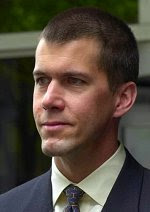 U.S. District Judge Vanessa Gilmore’s decision to conduct the re-trial of former Enron Broadband executives Kevin Howard and Michael Krautz during the latter stages of the media-saturated Lay-Skilling trial was highly prejudicial to Howard and Krautz.
U.S. District Judge Vanessa Gilmore’s decision to conduct the re-trial of former Enron Broadband executives Kevin Howard and Michael Krautz during the latter stages of the media-saturated Lay-Skilling trial was highly prejudicial to Howard and Krautz.
As it turned out, the juries in both cases deliberated at the same time, and the Howard-Krautz jury was deliberating amidst the media firestorm on the Thursday before Memorial Day weekend when the Lay-Skilling verdict was announced.
The following Tuesday, the Howard-Krautz jury returned a verdict convicting Howard and acquitting Krautz.
The dubious nature of the decision to conduct the Howard-Krautz trial during the Lay-Skilling trial is now becoming readily apparent.
This John Roper-Purva Patel/Houston Chronicle article reports that Howard’s defense team has filed a motion for a new trial that contains statements from two jurors and two alternate jurors in the Howard-Krautz trial alleging that the Howard-Krautz jury deliberations were seriously compromised and that certain jurors promoted a vindictive environment in the jury room “to fry” top Enron executives, including Howard.
It does not appear that the Chronicle reporters had a copy of the motion when they prepared their article, but the motion and affidavits confirm the following troubling allegations:
Jurors holding out for acquittal for Howard were threatened with physical harm from jurors pushing for conviction;
Contrary to Judge Gilmore’s instructions, certain jurors regularly discussed the case between themselves during the trial and, after deliberations began, discussions among certain jurors took place outside the jury room;
One male juror asserted that he was an expert on Enron because he had read one of the books on the Enron scandal, and used information from the book in persuading jurors to convict Howard;
The jury in the Howard-Krautz trial deliberated in a room literally next door to the room used by the Lay-Skilling. When the Lay-Skilling jury agreed on a verdict, the loud applause and cheering from the Lay-Skilling jury room was readily apparent in the Howard-Krautz jury room; and
Without advising attorneys involved in the case, Judge Gilmore met with and answered questions from the jurors at least twice during deliberations, including immediately after the Lay-Skilling verdict was announced.
According to the jurors quoted in Howard’s motion, Judge Gilmore told the jurors after the Lay-Skilling verdict that they had to reach a unanmious verdict, leaving the holdout jurors with the impression that a hung jury was not an option.
Moreover, one juror also advised the rest of the jurors that the hung jury in the previous Enron Broadband trial (a fact that was not brought up during the retrial) was a failure that would be emulated by jurors in the retrial if they also could not reach a verdict.
Although the allegations regarding Judge Gilmore’s ex parte communications with the jury will likely put her on the defensive and prone to deny Howard’s request for a new trial, the motion indicates that the Howard-Krautz trial probably should not have been conducted in Houston and, at very least, should never have been allowed to proceed during the Lay-Skilling trial.
The Fifth Circuit — which already has some issues with Judge Gilmore — is likely to take Howard’s appeal on these issues very seriously.

A true travesty of justice and waste of money becasue a few individuals had an ax to grind and no interest in the truth.